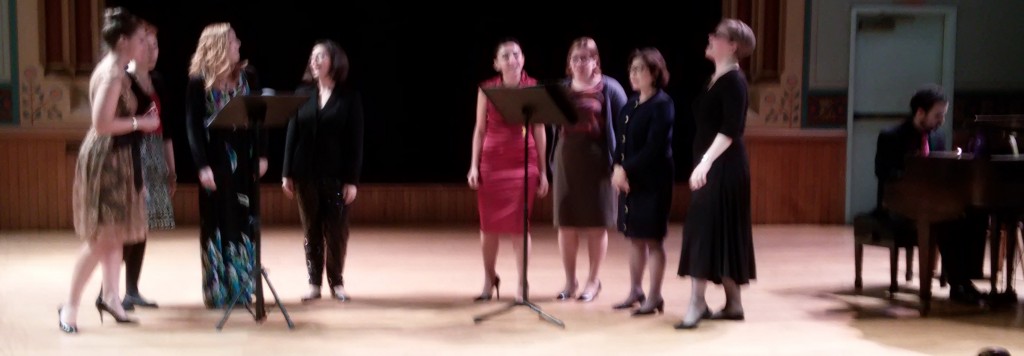The Women Composers Festival of Hartford (WCFH) is an indomitable event that has been taking place in March for fifteen years. Composers, musicians and scholars come together to create this Festival, and on Friday October 26, 2015, their Board of Directors organized a concert as a fundraising event, which also served to remind everyone about work of the Festival, and to bring audiences and musicians together for an artistically important and intellectually stimulating occasion. The concert took place in the lovely and historic Charter Oak Cultural Center.
The concert of 20 songs and piano works spanned time periods (Clara Schumann to newly composed music) and genres – classical art songs, selections from musical theatre, folk-inspired works and even experimental, genre-defying works. The emotional range, too, was vast – from poignant to comic. And works by men were included, to emphasize that the creative process so often is a collaborative one: Ralph Vaughan Williams was influenced by his wife, Ursula, in setting a poem of hers; and Manual de Falla’s arrangement of an innocent folk lullaby was followed by another folk lullaby arranged by Elsa Olivieri Sangiacomo, in which the mother suffers a betrayal by the child’s father. While not presented as such, the musical language of these two songs suggested that the latter might be a bitter reinterpretation of the former. As WCFH President Penny Brandt pointed out, lullabies written by women are often not the idealized, unperturbed views of the idyllic sleeping child presented by well-known bachelor composers such as Brahms and Schubert. Brandt’s example of this was an 1872 lullaby by Teresa Carreño, who, as a professional pianist, often toured with her four children. This piano piece (Le sommeil de l’enfant, performed by Brandt) begins soothingly but included agitated outbursts and restless flurries. The first half of the program concluded with the austere, mournful “Last Lullaby,” composed in 2010 by the (female) composer Tatev Amiryan, in memory of the Armenian Genocide (performed hauntingly by (Anna Hayrapetyan, soprano, and Brandt, piano). Brandt offered narrative between segments of the program, explaining the choice of works as well as the motivation of the Festival.
From the world of musical theatre, Lisabeth Miller (soprano, with Frank Viola, piano) gave us a gripping and insightful “How Could I Ever Know” by Lucy Simon. Highlights of the second half included Gala Flagello’s song “If I,” a soliloquy of insecurity that crescendoed and spiraled in a halting form reflecting its content. Soprano Amanda Kohl was both dramatically as well as vocally compelling.
I was very intrigued by Jessica Rudman’s “Glimpses” of 2006. A set of miniature piano works (performed with great sensitivity by Miguel Campinho) they were inspired by well-known pieces she was studying in a music theory class. We weren’t told what those pieces were, and it was perhaps more fun to guess. I heard delicate shards, glittering kaleidoscopic fragments reminiscent of Bartok, Debussy, and then the propulsive momentum of J.S. Bach. The varied flavors were at times juxtaposed in succession and even briefly layered in simultaneity.
Diane Lipari was assured and powerful in Amy Beach’s “Three Browning Songs.” These short, polished gems are among the prolific composer’s best-known works in this genre. Another (relatively) well-known gem was “Song to the Dark Virgin,” Florence Price’s setting of a poem by Langston Hughes. Amelia Nagoski sang this persuasively and with a vital freshness (with able support from Mahlon Peterson, piano)
I was fascinated to learn about María Grever, (1885-1951) a Mexican-born composer who wrote many bolero-inspired songs (such as the sultry “Júrame,” sung by Kohl, with Campinho) as well working as a composer in the U.S. film industry.
The entire Board came together to sing Jeanine Tesori’s “Forget About the Boy” (with Campinho energetically at the piano) providing a fun conclusion, full of spirited exuberance, and also demonstrating the Board’s unified dedication, as well as letting the audience acknowledge and thank them. Of course the lyrics had relevance – we don’t expect to ever “forget about the boy” — men are part of music history and our musical lives – but it’s about time that we stop forgetting about the girls – and women! Thank you, WCFH, for making that point so entertainingly!


